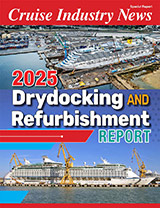A Danish research report released by the Danish Maritime Authority (DMA) earlier this year shows that Danish officers spend one-fifth of their working day dealing with what they consider to be administrative burdens. That is, they fill out forms, maintain documentation onboard and take part in ship inspections. (The study covered shipping in general.)
Released last December, the report was recently discussed by Nautilus International, a union representing British and Dutch maritime professionals at sea and ashore.
According to what the report called “a fictive, but typical Danish master,” there has been a tremendous increase in the administrative part of the job over the past 10 years. The paperwork was said to be burdensome because it is time-consuming and frustrating, sometimes bordering on being meaningless. One example given was the submission of multiple port documents, easily 20 documents in each port, consisting more or less of the same information. And often the documents are handled manually, even when they have already been submitted digitally.
As for inspections, according to the “captain” these are more focused on the status of the papers and the procedures than the actual safety issues.
The purpose of the study was to look at several areas, including whether more use of procedures and systems in achieving safety and environmentally friendly ships can be counterproductive. Do more rules equal more safety?
The study was also intended to provide feedback on the quality of the quality management systems. Also, in some cases, there are incentive structures that do not necessarily reward “good behavior.”
Overall, the objective was to highlight the administrative burdens that can affect seafarers’ job satisfaction and efficiency onboard ships.
Six types of burdens were identified: completion of port and pre-arrival documents; inspections; planning and execution of exercises and drills; operating quality management systems, according to ISM code; handling ISPS requirements; and completion of various journals (garbage journal, oil journal, etc.).



